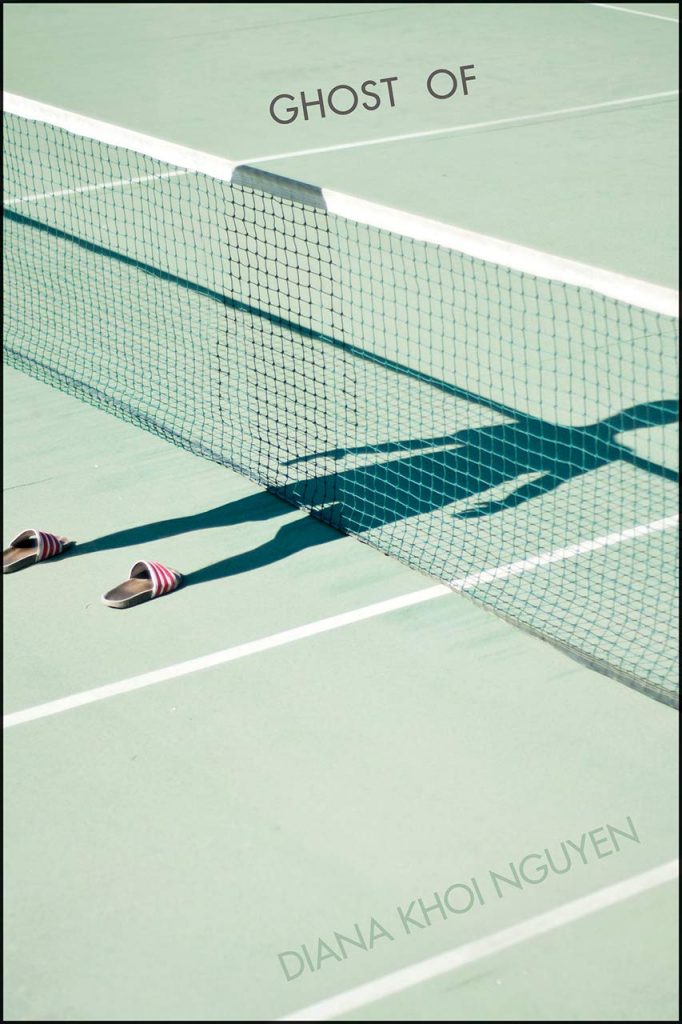
(Omnidawn, 2018)
REVIEW BY ESTEBAN RODRIGUEZ
__
To quote a phrase from Terrance Hayes’s foreword, Ghost Of by Diana Khoi Nguyen is a collection of “exile and elegy.” The poem’s first line proclaims there “is no ecologically safe way to mourn,” and because there isn’t, at least not within the collection’s context of loss, the search for identity, and the acclimation to a culture of a new country, Nguyen so confidently writes in a style and voice that is as innovative as it is maturely aware of its subjects and themes.
Two pages in, and we are introduced to one of the collection’s most intriguing forms; “Triptych” (the title of five other poems in this collection) is composed of an altered, blurred photograph of a family (Nguyen’s own) with a piece missing (which Nguyen’s brother cut himself before his death), followed by a fragmented poem (taking the shape of that figure), and a prose poem that seeks to illuminate the meaning behind the photo and the previous poem. Although a form like this runs the risk of seeming forced, and can look to an experienced reader like something the poet learned in a workshop and was excited to put on the page (think of all the poorly constructed ghazals that randomly show up in a collection that doesn’t need them and that don’t fit with the poet’s overall style), Nguyen is able to use this form in a manner that is never superficial. The beauty of these poems lies in the seemingly chaotic nature they take as the collection progresses. By the fourth “Triptych,” the photograph is altered to the point of nausea, and the fragmented poem that follows singles out the speaker’s brother, Oliver, as a figure so far removed from anything that resembles that serene family in the photo before:
Re
mem
ber the
handsom
e boy pla
ying ball i
n the decay
ed city? Thin
k about him
how he’s pla
ying and pla
ying not as
king a singl
e question,
think abou
t that how
My replication here doesn’t do the justice to what the reader will experience firsthand with these poems, nor will any replication successfully capture the essence of the “Gyotaku” poems (Gyotaku is a Japanese form of printmaking that uses fish or other sea animals as printing plates). These poems are more vibrant and visually jarring as Nguyen prints her text onto the altered photographs. In one instance, the name “oliver” (shaped into a disembodied figure) is juxtaposed next to the cut portion of a family portrait and then splashed in various trail-like patterns across the next page, all in different shades of black and gray. Such a technique recreates the footprint the speaker’s brother left behind. The speaker, through these pieces, copes with these memories, and the page offers no better canvas to visually express the labyrinth of emotions still fresh after such a loss. Near the end of the collection (in the last “Gyotaku” poem), multiple lines of olivers (printed in light gray) occupy the whole page, while a poem in the shape of dark figure lingers the right hand corner, as though the ghost or spirit has nowhere to go, stuck in a two-dimensional limbo that prompts the speaker to ponder how it’s “not the body/but the self that is/a suffering form.”
In no way should anyone confuse these poems as a cheap substitute for the language Nguyen achieves in the book’s more “traditional” poems. In “I Keep Getting Things Wrong,” the speaker reflects on their parents’ exile from Vietnam to the United States. The speaker’s father is depicted with deity-like qualities, giving “his hand to his mother,/[while] all around them, a thousand hands reach up” for salvation. The father leaves Saigon unscathed, resettling in Southern California. But such happiness doesn’t last long, and the speaker’s brother’s death inserts itself in the present as much as it does the past. The speaker feels inclined to “eat the food/left out for [her] dead brother” and at one point, while sitting at a desk typing, remembers that she dreamed twice that she “fucked” him. The speaker cannot escape what so painfully plagues her, and though for some it might be exhausting to read, the subject is reformulated in ways that allow for greater understanding, empathy, and reflection.
In other poems, the speaker imagines herself as a house occupied with emptiness and guilt, or envisions a world where she pours pieces of herself into a dog (not that the dog has any particular significance other than being an entity in which the speaker’s desires can be projected and potentially take form). Nguyen’s poems also extend to lyric narratives. The poem “Ghost Of” recounts a family’s history, detailing what appears on the surface to be trivial matters (how parents came about naming their son, how a young daughter walks around pigeon-toed, how seat belts enumerate a mother’s failures), but that ultimately shed light on the complexity of this “story of refugees” (a subject that is all too relevant in today’s social and political landscape). Ghost Of carefully moves at a pace that is thoughtful, innovative, and elegiac, and never once shies away from speaking about death in a manner that is both personal and universal. After all, as Nguyen so aptly puts it, in times such as these, “there is no shortage of gain or loss.”
—
Esteban Rodriguez is a poet and teacher. He is the author of DUSK & DUST, forthcoming from Hub City Press.
![[PANK]](https://pankmagazine.com/wp-content/themes/pank/assets/images/pank-logo-large.png)
